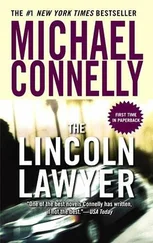He put on a pair of latex gloves and began the search by starting at the end of the bedroom hallway and working his way back toward the kitchen. There were three bedrooms but only one was used as such. He searched Dockweiler’s room first and found it to be a mess, with clothes and shoes strewn on the floor everywhere around the bed, most likely in the spots where they were shed. The bed was unmade and the sheets had a dingy gray cast to them. The walls were yellowed but not with paint. The room smelled sour with perspiration and cigarette smoke. Bosch kept a rubber-gloved hand over his mouth as he moved through it.
The attached bath was just as unkempt, with more clothing thrown in the bathtub and a horribly stained toilet. Bosch picked a hanger up off the floor and fished around in the bathtub to make sure there wasn’t anything or anyone hidden beneath the clothes. The clothes in the tub seemed dirty in a way separate from the clothes left on the floor of the bedroom. They were caked with a granular gray dust that Bosch believed might be concrete dust. He wondered if it was debris from an inspection or a Public Works project.
The phone booth shower was empty, its white tiles as dingy as the bedroom sheets, and the drain had trapped more of the concrete powder and granules. He next moved into a small walk-in closet in the bathroom and found it to be surprisingly neat, primarily because most of the items of clothing it would normally hold were on the bedroom floor and in the bathtub.
The two other bedrooms were used for storage. The small room was lined with glass-door gun cabinets with several rifles and shotguns on display. Most had tags attached to the trigger guards that identified the ammunition they were presumably loaded with. The larger guest bedroom was used for storage of life-sustaining supplies. There were stacked pallets of bottled water and energy drinks and boxes of canned and powdered goods that would presumably have distant expiration dates.
The closets of both rooms were similarly stacked, and there was no sign of Bella in that side of the house. As Bosch worked his way through the bedroom wing he could hear muffled voices from the kitchen. He could not make out words but he could detect tones and individual voices. It was Trevino doing almost all of the talking. He wasn’t getting anywhere with Dockweiler.
In the hallway near the bedrooms Bosch noticed an attic access door in the ceiling. There were fingerprint smears on the frame around it but these offered no hint as to how long it had been since Dockweiler was up there.
Bosch looked around and saw a four-foot-long wooden dowel with a hook on the end of it leaning against the wall in the corner. Grabbing it and threading the hook through the metal eyelet on the attic door, he pulled it open and found it very similar to the attic entrance at Olivia Macdonald’s house. He folded the hinged ladder down and started the climb.
Bosch found the pull string for an overhead light and soon was scanning the attic. The space was small and more boxes of survivalist supplies were stacked to the roof rafters. He climbed all the way up so he could see around boxes and into every angle of the attic to make sure Bella Lourdes was not there. He then climbed back down but left the attic open and the ladder unfolded so it could be accessed for a more thorough search with a warrant.
When Bosch moved into the living room and dining area he could clearly hear what was being said in the kitchen. Dockweiler was not cooperating and Trevino had moved to a threatening form of interrogation that Bosch knew was rarely successful.
“You’re cooked, my friend,” Trevino said. “It’s a DNA case. As soon as we match yours to the evidence collected from the victims, it’s over. You’re over. You’ll get consecutive sentences and never breathe free air again. The only way you can help yourself is to give us back Bella. Tell us where she is and we’ll go to bat for you. With the DA, with the judge, you name it.”
Trevino’s plea was met with silence. Everything the captain said was true but delivering it as threat would rarely get a suspect with the Screen Cutter’s profile to cooperate and talk. Bosch knew that a proper interview would appeal to his narcissism, his genius. Harry would’ve attempted to make Dockweiler think he was controlling the interview and bleed information out of him bit by bit.
Bosch crossed through the living room and into the entrance hallway. He saw Valdez leaning against the wall next to the archway to the kitchen, watching the interview with Dockweiler go nowhere. He looked back at Bosch and raised his chin, asking if Harry had found anything. Bosch just shook his head.
Just before the kitchen entrance, there was a door that led into the garage. Bosch entered, flicked on the overhead lights, and closed the door behind him. The space was also used for storage of survival supplies. More pallets of canned goods, water, and powdered mixes. Somehow Dockweiler had gotten hold of a supply of U.S. Army — produced MREs — Meals Ready to Eat. There were also nonedible supplies here. Boxes of batteries, lanterns, first-aid kits, tool kits, CO 2scrubbers, water filters, and enzyme additives for water filtration and use in chemical toilets. There were boxes of light sticks and medical supplies such as Betadine and potassium iodide. Bosch remembered those from his military training, when the threat of nuclear holocaust from the Soviet Union seemed real. Both chemicals acted as thyroid protection against cancer-causing radioactive iodine. It looked like Dockweiler was prepped for all possibilities, from terrorist attack to nuclear detonation.
Bosch returned to the door and stuck his head back into the entrance hallway. He drew Valdez’s attention and signaled him into the garage.
As the police chief entered, his eyes held on the stacks of supplies in the center of the garage.
“What is all of this?” he asked.
“Dockweiler’s a survivalist,” Bosch said. “Looks like he must put all his money into this stuff. The attic and two of the bedrooms are full of D-day supplies and weapons. He’s got an arsenal in one bedroom. And it looks like he could go three or four months with this stuff as long as he doesn’t mind eating Army beef stew out of a can.”
“Well, I hope he packed a can opener.”
“It might explain some of his motivation. When the world is coming to an end, people act out, take what they want. Is Trevino getting anywhere?”
“No, nowhere. Dockweiler’s just playing games, denying everything, then hinting he might know something.”
Bosch nodded. He assumed that he would get his shot as soon as he was finished with the search.
“I’m going to take a quick look at the truck and then call a judge. I want a legit warrant to really do a down-and-dirty search of this place.”
Valdez was smart enough to read Bosch’s thinking.
“So you think Bella’s gone, huh?”
Bosch hesitated but then nodded somberly.
“I mean, why would he keep her alive?” he said. “Our profiler said this guy was going to graduate to murder. Bella could ID him. Why let her live?”
Valdez dropped his chin to his chest.
“Sorry, Chief,” Bosch said. “Just being realistic about things.”
“I know,” Valdez said. “But we’re not going to stop until we find her. One way or the other.”
“I wouldn’t want to.”
Valdez clapped him on the arm and went back through the door into the house.
Bosch moved down a narrow passageway through the stacks to the driveway and Dockweiler’s truck. The front cab was unlocked and he opened it on the passenger side since it was most likely that side would show an indication if Bella Lourdes had been in the truck. On the passenger seat sat a large closed bag from a McDonald’s restaurant. Bosch stripped off a glove and placed the back of his fingers against the bag. It was slightly warm to the touch and Bosch assumed that Dockweiler’s arrival at the house had come after he went out to pick up dinner.
Читать дальше












